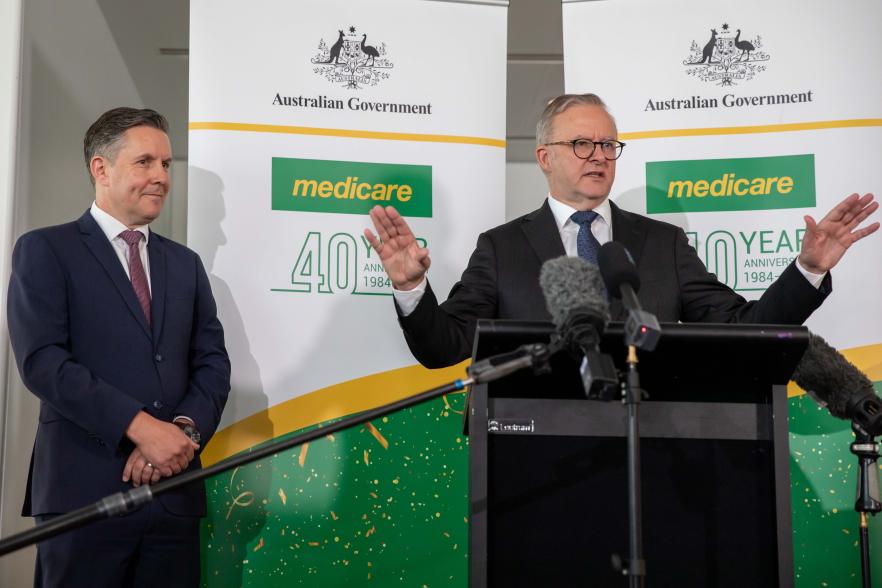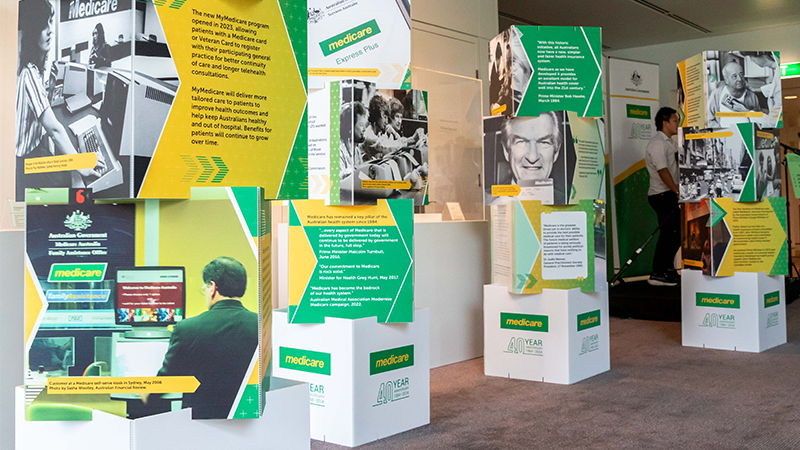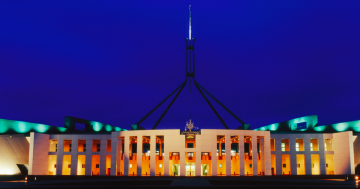
Prime Minister Anthony Albanese opens the pop-up display of Medicare’s history at Parliament House with Health Minister Mark Butler. The display will tour the country over the coming months. Photos: Department of Health and Aged Care.
Despite a rocky path to federal legislation, Medicare marks its 40th anniversary this year and Bruce McLaughlin remembers its inception.
The former public servant said it was a ”feeling of triumph” when the bill passed in the House of Representatives at Old Parliament House. The celebration occurred “very, very late at night” and they were all invited into the bar for champagne.
“In fact, I got home just in time to have a shower and get to work again,” Bruce said. “But shortly afterwards, my job – in effect – disappeared. I think we’d done too good a job of setting it up.”
Following a stint at Yale as part of a statistics scholarship he received from the World Health Organisation, Bruce was hired as an Assistant Secretary by the Department of Health in 1972. That year, Gough Whitlam’s cabinet was elected to government and immediately sought to extend healthcare coverage to the entire population by removing the previous three-tier system.
Leading this work was the Minister for Social Security Bill Hayden. A man, Prime Minister Albanese said upon Mr Hayden’s death last year, “that without … there could have been no Medicare”.
Bruce worked indirectly with Mr Hayden on the development of what was called ”Medibank” at the time, and saw it passed by a joint parliamentary sitting in 1974 despite it coming into question as one of the bills that led to a double dissolution.
After Mr Whitlam was pushed out by the governor-general, Medibank was slowly broken down over the ensuing years by Malcolm Fraser’s government, which pushed the public towards private health insurance.

Then-Treasurer Paul Keating opened the first Medicare office in Bankstown on 1 February, 1984.
It wasn’t until 1984 that the original model was reinstated by Bob Hawke’s government, renaming it Medicare so that it wasn’t confused with the still-existing Medibank Private, which had become a dominant player in the private sector.
Throughout this period of development, Bruce was in the Department of Health as an assistant director-general, and in the later stages was one of three in the public service involved with preparing Medicare for its return.
“I was a family guy with two young children and I’d been reliant on private health insurance up until then,” Bruce said. “So it certainly appealed to me as a citizen, I thought the whole thing was great.
“But it wasn’t such a novel idea, it’d been hanging around for a while. Most of the population seemed to be in favour of the bill when Hawke introduced it.”
He recalls one night among many during the debate in 1984, when he was sitting in a small alcove on the Labor side of the House of Representatives.
“I was listening to the politicians talking about the bill, and at one point saw Bill Hayden walk up to a wall bearing various pictures of Labor party leaders,” Bruce said.
“As he walked along looking up, he called one a ‘bastard’, the other one ‘OK’, and so on until Paul Keating came and dragged him to another room.
“Given the reputation Keating had at the time and later developed, it was a bit of a shock to the system.”
Reflecting on that period, Bruce said they did expect Medicare to go this far. And despite various governments changing it over time, both sides of the political spectrum tended to swear by it.



